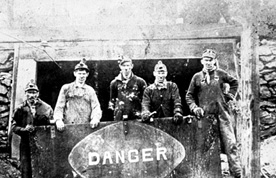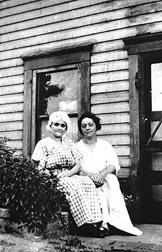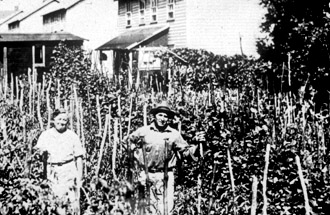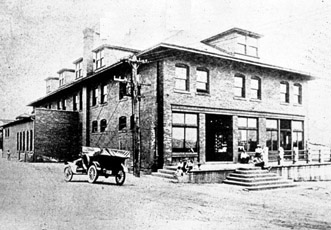

Eileen Mountjoy
This article is dedicated to the memory of Lillian Roof.
Many books and articles have been written about the lives of early Pennsylvania coal miners and their involvement in labor-management strife, unionization problems, and mine disasters. But has anyone remembered the women who packed the miners' dinner pails, washed their blackened clothing, and waited in anguish outside the mines when disaster struck?
The lives of these women also were caught up in a world of shifts, strikes, and underground danger. When asked to remember, retired miners' wives and women who spent their girlhood years in mining communities of the twenties and thirties can recall incidents from their day-to-day existence which give us a picture of that unique lifestyle which is gone forever.
An Indiana County coal miner's wife in the early days of the industry soon discovered that the routine of her days, as well as those of her husband, was determined by the whistle blasts which shrilled forth from the company office. These whistle blasts, like the tolling of a monastery bell, announced the miners' work schedules around which family life revolved. The absence of the whistle blasts created a heavy silence in coal towns, for this indicated that the mines were temporarily closed, and the pay envelopes correspondingly empty.
When her husband did work, his wife often worried about his safety, for the threat of an accident formed part of the miners' working conditions. One woman remembers that she always said a silent prayer while her husband readied his drills and dynamite in preparation for his shift. Having done all she could to guarantee his wellbeing, she filled the hours of his absence doing her job: keeping the family fed, the children disciplined, and the house clean.
Although a wife's anxiety for her husband's safety ended when she saw the welcome flicker of his carbide lamp in the darkness, her work did not. Particularly when the couple had a family, a woman's day sometimes extended to midnight or beyond. Mining town wives, with only a broom, dustpan, and mop, fought constantly with omnipresent coal dust. Mining town residents who slept with open windows wore telltale rings of soot around their nostrils in the morning, and a layer of black particles decorated the water in their washbasins. The housewife herself often hid her hair under a dustcap as she went about her chores.
In addition to daily cleaning, special spring, fall, and Christmas housecleanings required especially vigorous efforts, for when these occurred, windows were removed from their sashes for washing and rugs were taken out to be beaten. In these days before vacuum sweepers, some housewives saved used tea leaves, dampened them, scattered them on their floors, and swept them up, leaving a clean floor behind.
In addition to these ingenious housecleaning techniques, a miner's wife invented ways to decorate her home in spite of an habitual lack of money. She ordered her furniture from a catalog or from the company store. Living and dining room furniture was usually made of oak, sometimes with black leather upholstery. For bedrooms she bought iron bedsteads with cotton mattresses.
At the company store, mining town women bought bolts of the same coarse muslin used in the mines to block off dangerous or unused underground areas. From this material they made curtains, either on a treadle sewing machine or entirely by hand. The more imaginative housewives in town dyed their homemade products with coffee grounds. Called "ecrue" curtains, these took on a dark beige color which lightened with each consecutive washing. During spring cleaning the curtains were dyed again.
Usually, a coal miner's wife owned only one rug, which she kept in the living room. The rug too was made from mine muslin, the creation of many hours of hand braiding. Framed mottoes, religious pictures, and potted plants completed the attempts of the mining community housewife to make a home from a company house. In addition to making her own rugs and curtains, the miners' wives practiced many other economies every day. They made sheets, pillow slips, and towels from the versatile mine muslin. When the muslin's lifespan as bed linen was over, a worn sheet was cut up into four tea towels. The miners' wives made underwear for the entire family from old flour and potato sacks, and they saved any scraps for quilt patches, Many former coal town residents can remember aged relatives who went to their graves wearing homemade floursack underwear underneath their suits. Funerals prompted another thrifty practice: upon learning of a death, neighbors of the deceased searched their closets so that the bereaved family might attend final services properly dressed in black.
The housewife knitted all her children's socks, stockings, caps, and scarves. When stockings could no longer be darned, she cut off the foot part to make "tube" socks for younger children. A schoolgirl generally owned two dresses, "one on the hanger and the other on her back." Children passed along outer clothing down the line until it wore out completely; one woman who grew up in a coal town remembers that she never had a new coat of her own until she reached eighteen.
When finances improved, men joined "suit clubs" at the company store. In a few months, the suit was paid for, and the miner happily left the store with his new clothes. One woman remembers that her father, who had gone to the company store to pick up his long-awaited suit, left it behind and brought home instead a treasured gift of silverware for his wife.
After clothing her family in the most economical way possible, the miner's wife faced the problem of keeping those clothes clean in a community where coal dust filtered in even under the doorsills. Well into the 1930s, women in many coal mining towns carried all their own water for laundering. Sometimes two or three families shared a single pump, so it was wise to be up early on washday in cold weather, for latecomers faced a treacherously slippery pumphouse porch.
On washday, a veritable bucket brigade of women and children sloshed water from the pumphouse to the huge copper boilers simmering on the kitchen stove. The coal town housewife boiled her family's clothes and rubbed them "on the board" with homemade soap. When she hung her wash outside, she had to take it down quickly before the airborne coal dust blackened it again. A miner's work clothes never got completely clean, even with the application of lye to the blackest areas.
In addition to washing his clothes, a miner's wife usually washed the miner, too. In company towns all over Indiana County, a ritual was enacted daily when the men returned from work. Each miner bathed in the kitchen using a zinc tub which had been filled by his wife with steaming water. The weary miner stripped to the waist and knelt by the tub while his spouse scrubbed his back with soap, towels, and strips of old underwear. This accomplished, all women and children vacated the kitchen, closed the door behind them, and left the miner to complete his bath.
In times of two-day work weeks, the miner's wife faced a problem more serious than keeping her family clothed and clean: keeping them fed. In the twenties, many coal town families had an income of less than five dollars a week, a situation which required a great deal of imagination and hard work on the part of those responsible for cooking meals.
In the early 1900s, most coal town residents supplemented their company store order by keeping cows, pigs, and chickens in their backyards. But the coal companies, concerned about appearances, eventually banished the livestock to the outskirts of the towns. This edict, although it undoubtedly made the towns smell better, made the care of animals so difficult that they soon disappeared altogether. Some families, even after the cows left their backyards, maintained a few rabbits for meat.
In addition, every company house had a huge garden which filled every available inch of space on its lot. Housewives helped each other can and preserve large quantities of fruits and vegetables. Mothers expected children to participate in this yearly event by washing canning jars and sorting rings and lids. In the absence of refrigeration, some families set old washtubs into the clay floors of their cellars, where the temperature got so low in winter one could set "Jello."
Housewives made all their own bread, and older residents of coal towns remember the beehive ovens which stood in many backyards, where many efficient wives baked twenty or thirty crusty loaves each Wednesday. Menus reflected the rise and fall of the local coal industry, with buckwheat cakes and sausage for breakfast following a five or six-day work week, and oatmeal starting the day when the pay had been short.
Large families were the rule across the country in the twenties and thirties and in the coal towns, too, children formed a large part of the population. One woman who was raised in a company town recalls fondly, "Babies were the only new thing we ever got!" A great deal of modesty surrounded pregnancy and childbirth. Some women disguised their condition by the addition of layers of folded cloth worn under their heavy clothing, to create the illusion of a flat profile. One mother concealed her pregnancy from her older children so well that even her eighteen-year-old daughter was completely surprised when a baby brother joined the family.
Women seldom consulted a physician during their pregnancies and had their babies at home, attended by the company doctor and his nurse. After delivery the new mother "borrowed" a niece or capable neighbor girl, and took the customary six weeks to recover from the birth. One woman remembers that during these six weeks, her mother enjoyed playing her treasured piano. But when her "vacation" ended, the busy mother firmly closed the piano lid, and the endless round of cleaning and cooking engulfed her again.
The coal companies maintained a doctor who was readily available, and deducted three dollars a week from the miners' salaries to cover the cost. Large towns had a resident physician, and a traveling doctor visited small communities, checking in at the company store to see if anyone needed him. Sometimes mothers left notes with the store clerk describing her child's symptoms. If the doctor upon reading the note decided a house call was not necessary, he left a prescription at the company store for the mother to pick up later.
The company store was ubiquitous in the mining towns of Indiana County and all of western Pennsylvania. While Pennsylvania laws prohibited a coal-mining company from owning or operating such a store, the laws were easily circumvented. In most instances, stockholders of the coal company formed a separate corporation. Once in a while individuals who owned the coal company also operated the store. In all cases, however, a working agreement between the mining company and the store usually allowed the company to deduct wages for all items purchased. While patronage was not compulsory, some companies issued "checks" as payment to employees which were good only at the company store. Instances even existed of men who refused to patronize the employer's establishment being assigned the hardest work by superintendents. The following table, extracted from the United States government's study of western Pennsylvania's soft coal fields in 1911, graphically depicts the meager wages a miner received after deductions were made for the company store, company home and necessary equipment. Note especially the one Slovak miner who, for three months' work, took home only twelve dollars after deductions.
Occasionally, a parent brought a child to the company store for examination, which took place in a little hall outside the main room. Most mothers, however, practiced a little medicine on their own, and concocted some rather strange, though evidently harmless, remedies. One mother, upon hearing a case of diphtheria or scarlet fever in her locality, lined up her defenseless offspring and spooned into each a soupladlefull of castor oil containing nine drops of turpentine. After each child had visited the privy she considered her ounce of prevention well administered.
For a cough, the housewife-general practitioner sliced onions, sprinkled them with sugar, baked them in the oven, and liberally doled out the resulting syrup. A case of croup was treated with nine drops of kerosene taken on a spoonful of sugar. A more serious cough required a chest plaster made of dried mustard, lard, and soda. For sore throats, a mother spooned honey and sulfur into the sufferer. Sauerkraut juice made a fine laxative, and every former coal town child remembers his dose of sulfur and molasses in the spring.
With husbands absent for long periods of time when they worked, miners' wives did most of the disciplining of the children. Men and women who grew up in mining towns testify that their mothers kept them so busy they had no time for mischief. An idle child was handed a broom and told to sweep the porch. Parents expected even the very youngest children to work as soon as they were able; preschoolers were sent into the garden with a tin can to collect potato bugs.
After the coal man delivered house coal with his horse and wagon, and the older boys had shoveled it into the coal shed, the younger children took turns wiping out the black dust which settled in the nearby privy. Boys took pride in using their penknives to clean out their fathers' carbide lamps; when this had been done, the lamps were turned over to the girls to polish with Dutch Cleanser. Older children helped with younger ones and also where needed in the neighborhood,
In one town, there lived an elderly lady with arthritis so severe that kneading bread became impossible. On each baking day a mother sent her teenaged daughter over to help, with no payment given or expected. Most Indiana County residents who grew up in coal towns agreed that their mothers, although not able to provide them with expensive toys and clothing, helped them to develop a sense of responsibility early in life.
Occasionally miners' wives had more serious matters to face than potato bugs. In 1924, when the coal companies across the state broke up local unions, officials hired the Coal and Iron Police to terrorize union supporters. In Sagamore, the hired thugs went door to door one morning, searching for known union men. One woman remembers how the "police" forcibly vacated the company houses which were needed for the "scabs" who had been hired to replace the fired union men. One housewife was thrown out into the street as she prepared breakfast, her loaf of bread tossed out after her. A whole family fled seven miles to Plumville on foot. In another town the Coal and Iron Police threw lighted sticks of dynamite between rows of houses, breaking windows and causing general panic among the women.
All coal miners' wives feared accidents in the mines. Knowing that crowds made rescue work more difficult, some company officials hesitated to sound an alarm in case of an explosion or cave-in, but miners' wives had other ways of discovering that an accident had occurred.
In Aultman, for example, when the women shoppers in the company store saw blankets being piled into a car they knew that something had happened at the mine at McIntyre, five miles away. A resident of Aultman who lived through such an experience will never forget the sight of women running down the street to the company store trying to find out if anyone had been killed.
The coming of the depression of the thirties brought new problems to miners' wives as it did to the entire company. Already accustomed to stretching their dollars, real courage was required when the average Indiana County coal mine operated only one day a week. One woman recalls that while the economy slumped, her family ate meat once a week. On the remaining six days the thrifty housewives served eggs, cheese dishes, and meatless spaghetti. Baked bean sandwiches went into lunch buckets; fried carrots and potatoes made an evening meal. Another woman remembers how her mother and the next door neighbor cooperated on baking day: one housewife owned a rolling pin, the other a flour sifter.
Women who by the thirties had wringer washing machines and electric irons reverted to doing some of their laundry on the old washboard, and pressing clothes with a heated sadiron. Children pitched in, sorting dried beans and making visits to the town's "boney pile" to bring their mothers burnable lumps of coal from among the scrap. In some towns, women found it necessary to tie a dog to the family coal shed to guard against an occasional child who found it simpler to locate coal in a neighbor's yard.
The miners' wives in one community became desperate and organized an orderly march on their company store. After the housewives threatened to force their way in to take food for their children, a clerk called the Red Cross, who brought out flour and dried beans. Miners' wives who survived the depression believe that years of practicing the strictest economy helped them get through the hard times with a minimum of panic.
Women who lived in company towns emphasize the fact that they seldom went anywhere outside their homes. Few families owned a car until the forties; in towns without a streetcar everyone walked. A miner's wife who lived in Coal Run in the thirties thought nothing of walking a ten-mile round trip to McIntyre to visit relatives.
Within the community, women enjoyed quilting parties, Sunday School class meetings, and family dinners. By the late thirties most coal miners' families had a radio and relied heavily on the new invention for news and entertainment. One former coal town child remembers that her bedtime came each evening when "Orphan Annie" signed off at eight o'clock.
By the end of the Second World War some mining communities were already obsolete. Coal ran out in some while in others an improved economy enabled miners for the first time to own a car and move their families away from the mine itself. Though women who once lived in the company towns feel little nostalgia for coal dust and frozen pumphouse porches, they sometimes look back wistfully to a time when neighbors gathered to can peaches, or to walk to a ballgame on a summer evening, and a parent could thrill a child with a Christmas tree which had no presents underneath.

